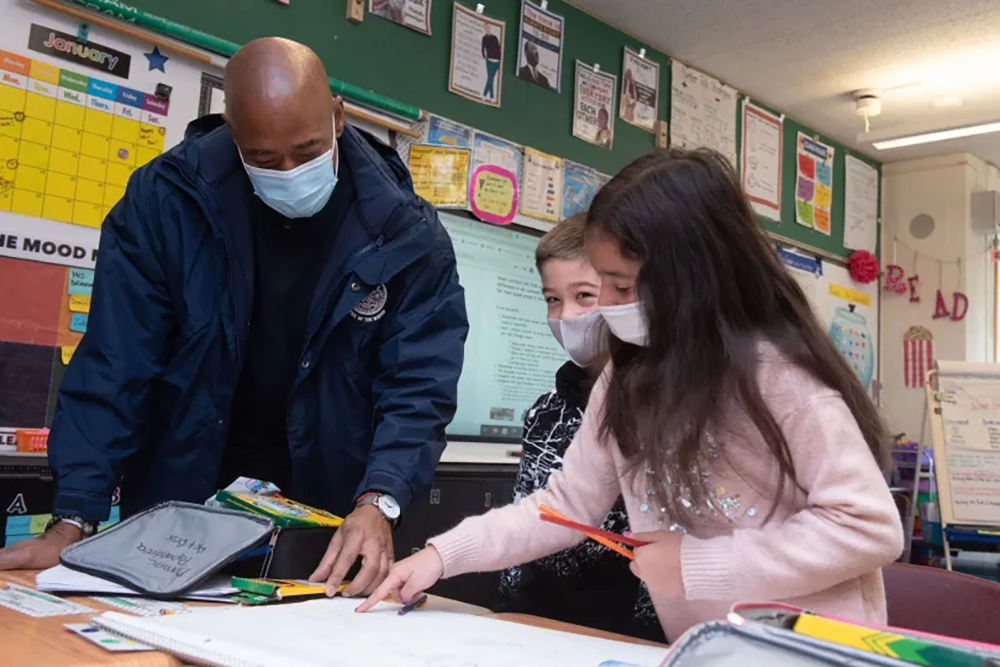State lawmakers strike a deal to give NYC’s mayor just half the four years he sought — and it’s tied to new checks on his power, as well as downsized classes.
By: Reema Amin, Chalkbeat & Josefa Velasquez – TheCity.nyc
Mayor Eric Adams will continue to retain control of New York City schools under a deal struck by state lawmakers Monday. But the first-term mayor will have to be back in Albany sooner than he had hoped to get it renewed and will now also be tasked with shrinking class sizes over the rest of his time in office.
State lawmakers reached a deal to grant Adams a two-year extension of mayoral control of city schools, half of the four years the mayor and Gov. Kathy Hochul had proposed to fellow Democrats who control the Legislature. The deal includes several changes to the city panel that votes on education policy.
Tied to the measure is another major move to cap the size of classes in city schools between 20 to 25 students, depending on the grade, over the next five years. A boon for the teachers union, the cap will likely be a costly endeavor for the city’s education department.
The Adams administration said it was reviewing the proposals, which are expected to go before the Legislature for a vote later this week and then to Hochul.
While the mayor and governor had pitched a four-year extension of school control, Democrats in the State Senate were reluctant to give Adams such a long stretch since his administration did not provide lawmakers a plan or pitch proposals for what they wanted to accomplish with mayoral control, according to a source briefed on the internal discussions.
Instead, most lawmakers discussed granting Adams just one or two years of mayoral control of city schools, with “very few” even backing the idea of granting him three years, the source said.
“I think this is a win for the Adams administration: They retain control, which is what the mayor asked for, and it’s a win for parents and the public,” said Sen. John Liu, a Queens Democrat who chairs the Senate’s New York City education committee.
A one-year extension felt too “destabilizing,” Liu said, because lawmakers would have to reconsider the matter less than a year from now. Two years would allow legislators to take a closer look at New York City’s school governance structure, he said.
“There’s a great deal of interest in seeing whether mayoral control has better served the schools as opposed to elected school boards,” Liu said.
But the extension to mayoral control also ties in some checks on Adams administration.
In an effort to boost parent voice, lawmakers also agreed to expand and make several changes to the Panel for Education Policy, or PEP, a currently 15-member, mostly appointed board that votes on major policy proposals and is subject to strong influence from City Hall. In perhaps the most significant change, the mayor and the five borough presidents will no longer be allowed to remove members if they don’t vote a certain way.
For the class size proposal, a potentially substantial price tag is already causing some chafing at City Hall, according to people briefed on the administration’s thinking.
While estimates on how much it would cost the city to limit the number of students in a class are still being calculated, a stricter class size cap that failed to gain traction late last year in the City Council pegged the cost at nearly $1 billion a year over 30 years.
Liu pointed to funding already provided by the state under Foundation Aid, a formula that sends more money to high-needs schools. That formula resulted from a lawsuit known as the Campaign for Fiscal Equity, and just last year, state lawmakers agreed to fully fund it by 2023.
“The [Campaign for Fiscal Equity] funding was about providing a sound basic education, to which small class sizes is a key element,” Liu said.



